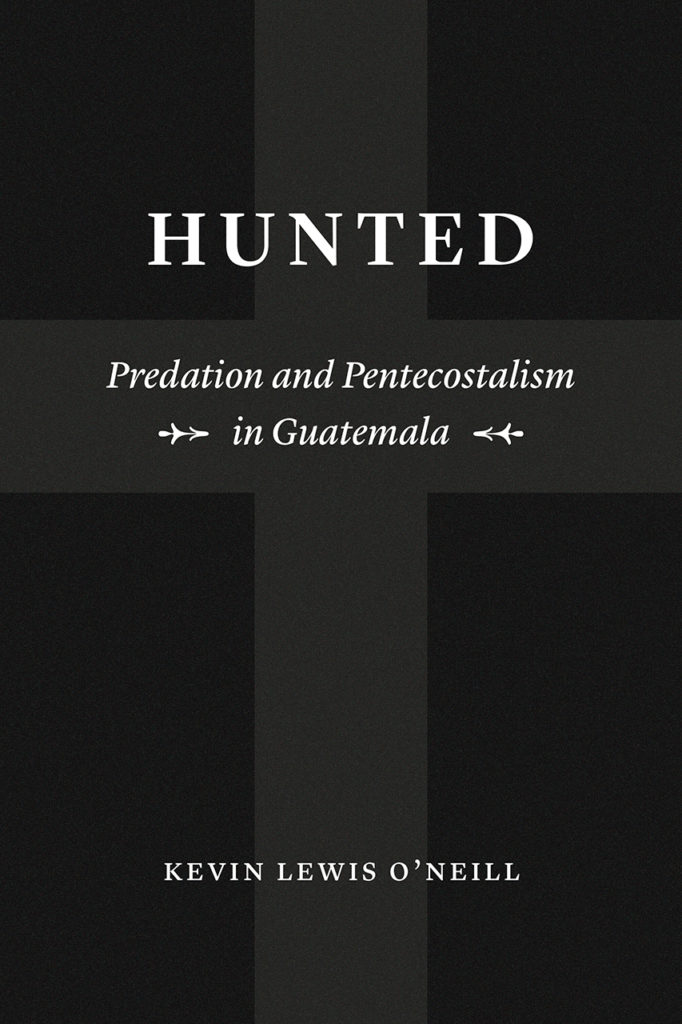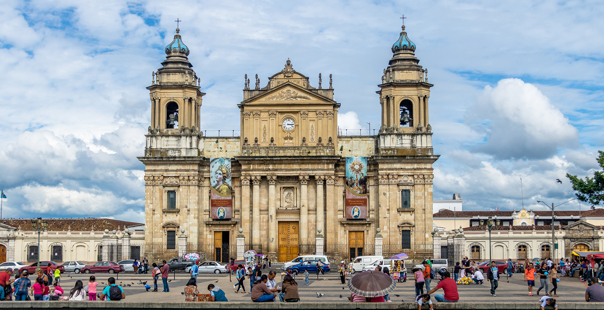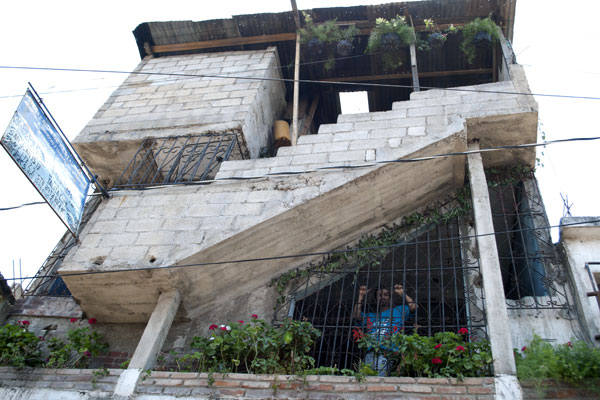Hunted: Predation and Pentecostalism in Guatemala
A book excerpt with an introduction by the author.
Hunted: Predation and Pentecostalism in Guatemala explores Pentecostal drug rehabilitation centers in Guatemala City and their practice of bringing (oftentimes dragging) users to Christ. The faithful call it hunting. For over ten years I completed fieldwork in Guatemala City as religious men snatched drug users off the streets, often at the request of family members, and locked them up inside their centers for months, sometimes years. Focused on the chase, the book re-envisions the role of the pastor as a peacemaker to, instead, a potential predator who hunts for souls to save. As one pastor told me: “Sometimes you choose Christ but sometimes Christ chooses you.” The turbulence of this dynamic ultimately transformed this book into an experiment in form. Organized around the theme of captivity, Hunted proposes predation as a root experience of our world today.
This excerpt comes from the book’s Preface.
***
Alejandro handed me a letter on June 2, 2016. He did it quietly, when no one else was looking. We sat shoulder to shoulder inside one of Guatemala City’s Pentecostal drug rehabilitation centers, listening with fifty-five other captives (internos) to sermons about sin and salvation. The center was a grey stump of a building, a simple two-story house that held drug users (often against their will) for months, sometimes for years. Alejandro was one of these users. A proud man in his midthirties, with tired eyes and strong arms, Alejandro often waxed philosophical, but this time he didn’t. After pressing the piece of paper into the palm of my hand, he leaned in to say: “Get me the fuck out of here.”
The letter read:
Help Me National Police!
My name is Miguel Alejandro Gonzalez, born January 15, 1982. I am of sound mind and body. I know clearly that I do not want and do not need to be in this ministry and in this rehabilitation center.
On April 28, 2016, the pastor tracked me down, found me, and then brought me back to his house against my will. He forcefully detained me with the help of two men from the house by throwing me in the back of a truck.
I told them that I did not want to go to the house. I do not want to be held captive. Every day that passes I tell them that I do not want to be inside the house, but the pastor tells me that he is going to kick my ass.
The punishments here are severe. Here are some examples:
-They withhold food from me
-They yell at me in a loud voice
-They make me clean the house
-They keep me in a very hot room all day long
-I sleep on the floor
-They tie me up with ropes for hours
Please, I do not want to be here. I am here against my will. My family did not put me here, and they do not know where I am. They did not sign a contract, and they are not paying for me to be here.
Please send help so that I can get out of this house.
Thank you,
Miguel Alejandro Gonzalez
 Alejandro had been hunted. At the outer edges of today’s war on drugs, where the state is weak and churches are strong, Christian vigilante groups scour the streets of Guatemala City with singular intent: to pull drug users out of sin by dragging them into rehab. Often in the middle of the night, when the capital city is an absolute ghost town, three or four recovering users drive with their pastor to the house of an active user. At the request of a wife, a mother, or a sister, each at wits’ end, this hunting party (grupo de cacería) hovers over the man while he sleeps. They say a short prayer, and then it gets physical. One man takes the legs. Another two grab the arms. A fourth (if there is a fourth) controls the neck. Sometimes they choke him out. All the while the user, suddenly and unexpectedly crucified to his bed, struggles in vain.
Alejandro had been hunted. At the outer edges of today’s war on drugs, where the state is weak and churches are strong, Christian vigilante groups scour the streets of Guatemala City with singular intent: to pull drug users out of sin by dragging them into rehab. Often in the middle of the night, when the capital city is an absolute ghost town, three or four recovering users drive with their pastor to the house of an active user. At the request of a wife, a mother, or a sister, each at wits’ end, this hunting party (grupo de cacería) hovers over the man while he sleeps. They say a short prayer, and then it gets physical. One man takes the legs. Another two grab the arms. A fourth (if there is a fourth) controls the neck. Sometimes they choke him out. All the while the user, suddenly and unexpectedly crucified to his bed, struggles in vain.
“They just grabbed me right off the streets and threw me in here,” Alejandro later explained. “They’ve done it a few times before. I was here six months, and then they let me go. I was out fifteen days, and then they came and got me again. I did another two, maybe three months, and then I got out again.” Alejandro looked exhausted. “And now I’m back.”
These hunts can be harrowing. I once saw four men from the center corner a young man inside his parents’ house. Too strong for his own good, he fought his huntsmen for what seemed like an hour, wrestling with each of them one by one. As I paced nervously off to the side, wondering why the four didn’t just rush him all at once, it occurred to me that they were tiring him out. When the young man eventually flagged, the four hog-tied him with such force that I suddenly found myself speaking up. The ropes are too tight, I pleaded. You crossed a line, I stammered, but as I stepped into the fray, I felt a hand holding me back. “Don’t be stupid,” someone said. That voice was Alejandro’s.
Alejandro’s letter did not just open a window into the horror of human vulnerability and the experience of being prey; it was also a stark reminder that Alejandro had hunted, and he had hunted for years.

Guatemala City
“How many?” Alejandro mused, taking a moment to count. “Three hundred.” He quickly checked himself: “No. I’ve been on more than 300 hunts.” Alejandro’s best guess signaled his years spent inside these centers as well as his ability to hunt down drug users. “I had to pick up some guy a few nights ago,” he told me not too long after handing me his letter. “See the guy over there? In the green shorts?” Alejandro pointed to a young man named Santiago. “I had to grab him from his bed,” Alejandro explained, “because his mom paid [the pastor for] us to do it.” Alejandro shook his head. “And it’s not the first time,” he said. “It’s actually the second time I’ve hunted him this year.” He then paused just long enough to get the story straight, adding, “And the worst thing is that I end up having to tie people up. We have a jacket with ropes, like a fucking straitjacket, and when someone doesn’t do what the pastor tells him to do, I have to tie him up.”
Alejandro cringed. “I’m tired of hunting,” he said, “because when I leave here, the people I’ve tied up come looking for me.” He seemed to grow indignant. “But they don’t understand that I have to hunt. It’s what I have to do to eat better, to sleep a little longer, so I can get a shower here.” Alejandro then connected the dots for me: “Hunting is why the pastor keeps me here. The pastor hunts me because I hunt for him.”

Rehabilitation facility in Guatemala
This is a book about humans hunting humans. It is an ethnography of Pentecostals who track down drug users, as if they were animals, to remind them, in classic Christian fashion, that they are human—that, in the words of so many missionaries before them, it is not enough to be human: one must also act human. After years of fieldwork alongside Alejandro but also many others, I came to understand this hunting as a kind of predatory pastoralism. This is the Christian impulse to seek out, tie up, and drag back those sheep that have wandered from the fold. It is a disruptive insight for at least three reasons. The first is that it upends the more standard philosophical position that pastoralism and predation have opposed genealogies—that persuasion is different from coercion. I now regard pastoralism and predation as not really at odds with each other but rather as interdependent modes of governance. “It’s about saving a life,” Alejandro insisted. “That’s why we beat these guys, tie them up, and drag them here like pigs.”
The second realization is that every hunt presupposes a theory of its prey, a clear sense of who can be hunted and why. Whereas manhunts tend to presume an ontological distinction between the hunter and the hunted, predatory pastoralism announces that everyone is a sinner in the eyes of the Lord. This means that salvation is the only way to escape—and that what must be evaded is not the chase or the center but oneself.
The third insight is that predation upsets an increasingly bundled set of images about pastoralism. Across the humanities and the social sciences, from a range of theoretical and methodological commitments, scholars deliver steadfast portraits of state withdrawal, their key terms telling all: dispossession and disposability; expulsion and exposure; precarity and social abandonment. While each advances an analytically distinct proposition, each also contributes to a single, powerful image of the failed shepherd, of people left to die.
Hunted tells a different story. Its subplot is not that the masses have been left behind. Instead, a more constructive reading, a more challenging line of inquiry, is that they have been given a head start. “I climbed out of that window,” Alejandro said, “before they put the bars up.” On the second floor of his pastor’s center, Alejandro gestured towards the light. “I slid out that window, hung from the sill, and then dropped to the sidewalk.” Alejandro walked me closer to the windows. “I was high a few hours later,” he then said, “but I made sure I got a gun. I knew that they would come for me. I knew that the pastor would hunt me down.” And the pastor did. The details of this hunt repeat themselves across Guatemala City with such consistency that one begins to wonder whether the failed shepherd is really such a failure after all. The shepherd seems quite capable of catching and releasing his prey. That is the point. The political demand nipping at the heels of Alejandro as he escaped from the pastor’s center was not to make live or let die but rather to hunt or be hunted.
Kevin Lewis O’Neill is a professor in the Department for the Study of Religion and director of the Centre for Diaspora and Transnational Studies at the University of Toronto. The author of City of God (University of California Press, 2010), Secure the Soul (University of California Press, 2015), and Hunted (University of Chicago Press, 2019), O’Neill is currently writing a book about clerical sex abuse in Latin America.